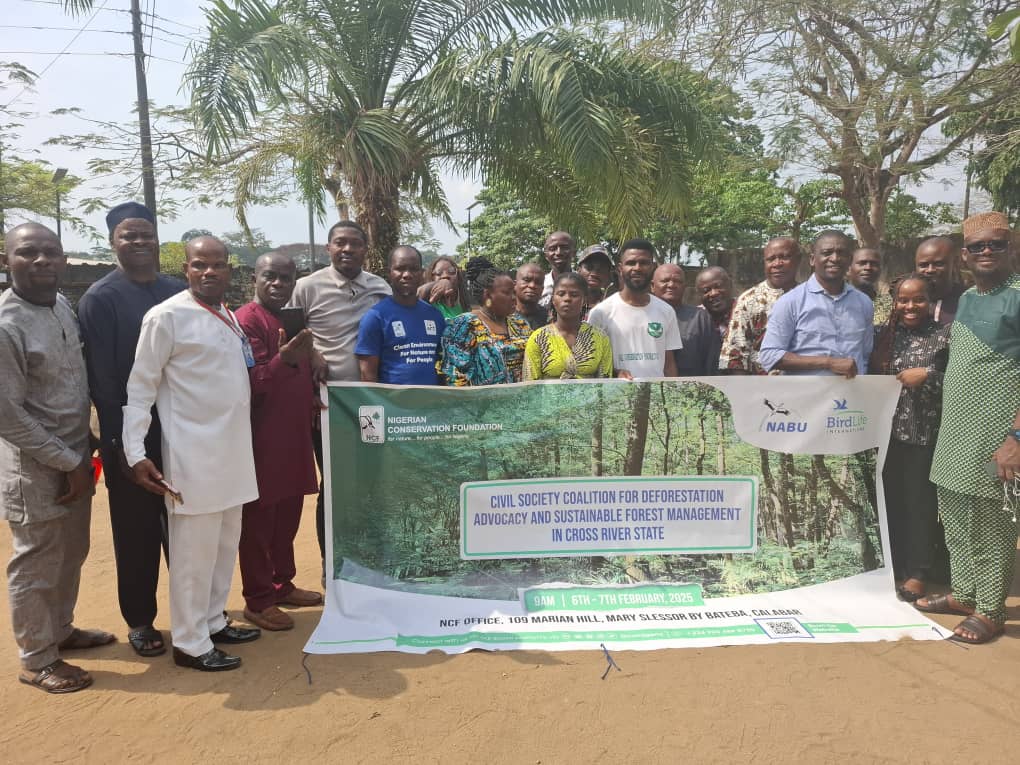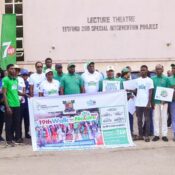
CSOs Unite to Combat Escalating Deforestation in Cross River State
Calabar, Nigeria – February 6-7, 2025.
According to reports from Global Forest Watch 2024, Nigeria has an alarming deforestation rate of 3.5% annually, and Cross River State, home to nearly 50% of the country’s remaining forests, has been hit hardest. From 2001 to 2023, the state lost 134,000 hectares of tree cover, a staggering 11% decrease, making it one of the highest rates of deforestation globally.
Between 2008 and 2024, despite a ban on logging, the state witnessed unprecedented levels of forest destruction, worsening environmental degradation and threatening local livelihoods. Deforestation exacerbates climate change, weakens carbon sequestration, and increases flood risks in coastal areas.
Furthermore, this has significantly reduced agricultural yields, endangered biodiversity, and disrupted ecosystems that sustain rare species such as the Cross River gorilla, Drill monkeys, Nigerian-Cameroon chimpanzee, pangolins, and forest elephants. Without urgent action, future generations will inherit a barren landscape, devoid of the rich natural heritage that has sustained Cross River State for centuries.
Understanding this challenge, The Nigerian Conservation Foundation (NCF) hosted a Stakeholders Workshop on CSO Engagement on Deforestation in Cross River State at its Calabar office. The two-day event convened civil society organizations (CSOs), environmental experts, policymakers, and the media to deliberate on the alarming deforestation crisis in the state and proffer solutions to remediate the problem.
Key Issues Identified
During the workshop, stakeholders highlighted pressing environmental concerns:
- Unregulated Logging: The state’s pristine rainforests are being depleted at an alarming rate due to massive illegal logging.
- Infrastructure Damage: Illegal logging is damaging roads and bridges, increasing public expenditure on repairs.
- Biodiversity Loss: The destruction of forests is pushing endangered species toward extinction, jeopardizing the region’s ecological balance.
- Livelihood Disruptions: Forest-dependent communities are losing traditional means of income and sustenance.
- Illegal Activities in Protected Areas: Illegal loggers have constructed access roads into protected areas, facilitating mining and poaching.
- Environmental Degradation from Mining: Unregulated mining activities within protected areas are worsening deforestation and causing soil erosion.
- Watershed Disruption: The destruction of forests is negatively impacting water resources, affecting both local communities and agricultural productivity.
- Decline of Ecotourism: The loss of biodiversity is reducing the state’s ecotourism potential, threatening a viable alternative to unsustainable forest exploitation.
- Mangrove Deforestation: Widespread mangrove destruction for firewood is depleting aquatic species and endangering coastal ecosystems.
- Weak Enforcement of Laws: Despite the existence of Cross River State’s Forestry Commission, State Climate Change Council, Protected Area Authority, Green Economy Commission, and other forest regulatory agencies, individuals and groups continue to exploit forests with impunity.
Formation of a CSO Coalition for Forest Conservation
A significant outcome of the workshop was the formation of the Civil Society Coalition for Environmental Justice and Forest Conservation in Cross River State. This coalition will coordinate advocacy efforts, drive policy changes, and promote sustainable forest management in collaboration with the government and other stakeholders.
The coalition appointed Mr. Emmanuel Owan of NCF as General Secretary, with the NCF Calabar office serving as its secretariat.
Resolutions and Call to Action
The coalition put forward a series of resolutions to address deforestation:
- Stronger Enforcement of Forest Laws: Authorities must strictly implement logging bans and prosecute offenders.
- Sustainable Alternative Livelihoods: The government should support forest-dependent communities with sustainable economic opportunities.
- Investment in Forest Regeneration: Large-scale tree-planting initiatives should be adopted to restore degraded lands.
- Strengthened Multi-Stakeholder Partnerships: Collaboration between CSOs, government agencies, the private sector, and international partners is crucial.
- Community Awareness Campaigns: CSOs will engage local communities through vernacular and English-language jingles set to air from March 2025.
- Promotion of Ecotourism: Sustainable tourism can provide an alternative income source while preserving natural habitats.
- Crackdown on Illegal Mining: The coalition called for an immediate halt to illegal mining activities within forest reserves.
- Protection of Civil Society Advocacy: The government must respect and support CSO efforts in conservation without undue interference.
Press Conference and Media Engagement
To amplify their message, the CSO coalition held a press conference, engaging national media outlets such as Punch, Nation, Tribune, Vanguard, and Arise TV. This effort aims to drive national awareness and accountability regarding Cross River’s forest crisis.
The Next Steps for Forest Conservation
With the establishment of the CSO coalition and its advocacy roadmap, stakeholders remain committed to ensuring Cross River’s forests are protected, restored, and sustainably managed for future generations. As the leading environmental organization in Nigeria, NCF will continue to champion conservation efforts, advocate for policy reforms, and empower local communities to take ownership of their natural resources.
Join the Movement
The fight against deforestation requires collective action. Support NCF and the newly formed Civil Society Coalition for Environmental Justice and Forest Conservation in Cross River by:
- Spreading awareness on social media using #SaveCrossRiverForests.
- Volunteering for conservation initiatives.
- Supporting policies that promote sustainable environmental practices.
For media inquiries, partnerships, or more information, contact media@ncfnigeria.org or visit www.ncfnigeria.org.



